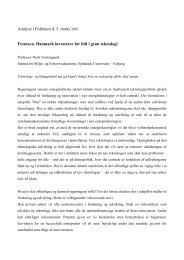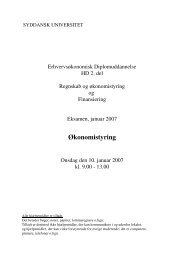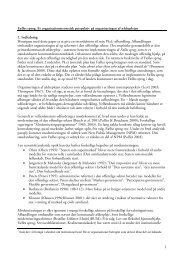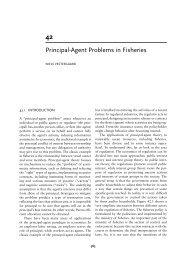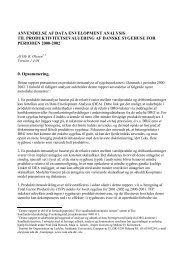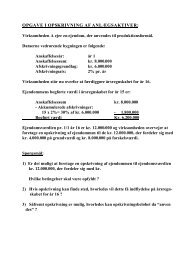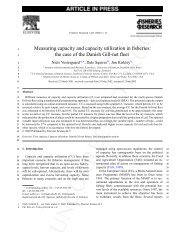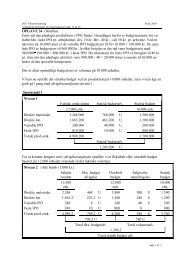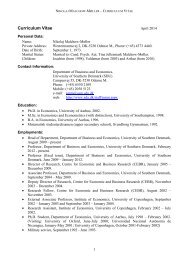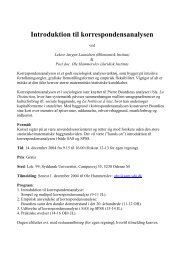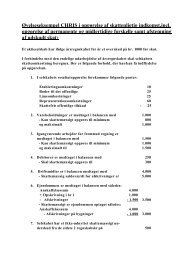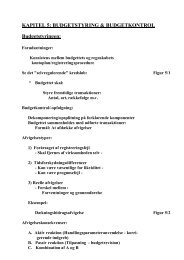Basically the absence <strong>of</strong> clear constitutional rules <strong>and</strong> the difficult cohabitation between presidents<strong>and</strong> governments were sometimes due to weak democratic culture <strong>and</strong> strong party systempolarisation. In several cases the president <strong>and</strong> the Prime M<strong>in</strong>ister belonged to different parties.Thus cohabitation “<strong>in</strong> the French sense” took place <strong>in</strong> Pol<strong>and</strong> under the post-communistgovernment (Walesa versus the SLD-PSL government), <strong>and</strong> later under the AWS-UW government(Kwasniewski versus AWS-UW government).In some cases the <strong>in</strong>tervention <strong>of</strong> presidents nullified a governmental crisis <strong>and</strong> a “deadlocked”situations. That took place <strong>in</strong> 1993 when president Lech Walesa dissolved the parliament after vote<strong>of</strong> non-confidence aga<strong>in</strong>st the Hanna Suchocka government, <strong>and</strong> larer when Walesa <strong>in</strong>tervenedaga<strong>in</strong>st Jan Olszewski’s government. President Vaclav Havel’s <strong>in</strong>tervention <strong>in</strong> late 1996 thatremoved Vaclav Klaus from the post as Prime M<strong>in</strong>ister, was controversial from a constitutionalpo<strong>in</strong>t <strong>of</strong> view, but the f<strong>in</strong>al outcome, the establishment <strong>of</strong> a caretaker government <strong>and</strong> new un-timeelections <strong>in</strong> summer 1998, looked like the best solution <strong>in</strong> the then prevail<strong>in</strong>g almost “deadlocked”political situation.Formation <strong>of</strong> new parties some times follow after successful presidential campaigns. The rise <strong>of</strong> theMovement for the Construction <strong>of</strong> Pol<strong>and</strong> (ROP) was <strong>in</strong>itiated by Jan Olszewski, one <strong>of</strong> thesuccesful c<strong>and</strong>idates at the 1995 presidential election. Just before the 1995 election Lech Walesaestablished the presidential party (BBWR), <strong>and</strong> after the 2000 presidential election the presidentialc<strong>and</strong>idate, Andrzej Olechowski, together with defectors from the Freedom Union (UW) <strong>and</strong> AWSestablished the liberal platform (PO). Normally such “spontaneously” created party formations arebadly <strong>in</strong>stitutionalised <strong>and</strong> thus vulnerable to <strong>in</strong>ternal splits on policy, programme as well as actorlevel. Actor rivalisation (“wars <strong>in</strong> the top”) <strong>and</strong> political craft<strong>in</strong>g has been strik<strong>in</strong>g because <strong>of</strong> theweak party <strong>in</strong>stitutionalization. In the Czech Republic, Slovakia <strong>and</strong> Hungary characterized byparliamentary political systems no dist<strong>in</strong>ct presidential parties have ever been represented <strong>in</strong>parliament.1.11. The new political elitesThe establishment <strong>of</strong> political parties was closely connected with the emergence <strong>of</strong> new politicalelites. At the time <strong>of</strong> the demise <strong>of</strong> the old systems <strong>in</strong>dividual politicians had good opportunitiesforleave one’s mark on the political agenda (“political craft<strong>in</strong>g” <strong>and</strong> “political entrepreneurship”).James Tool (Toole, 2003) <strong>and</strong> Jon Elster, Calus Offe <strong>and</strong> Ulrich K. Preuss (Elster etc., 1998)belongs to those, who argue that the devlopment <strong>of</strong> political parties <strong>in</strong> the new democracies <strong>in</strong> anuntil then unseen extent was pushed forward by the new political elites <strong>and</strong> the significance <strong>of</strong>political elites for further consolidation af democracy (“<strong>in</strong>stitutional agency”). Prime M<strong>in</strong>isters,presidents <strong>and</strong> some other m<strong>in</strong>isters, especially the m<strong>in</strong>isters <strong>of</strong> f<strong>in</strong>ance, obta<strong>in</strong>ed an importantposition due to the chaotic situation <strong>and</strong> the weak party <strong>in</strong>stitutionalisation. As we have seen, theparties were mostly established top-down <strong>and</strong> became elitedriven. After the demise <strong>of</strong> the oldsystems new elite structures emerged. Special <strong>in</strong>terest was attached to the new non-communistelites <strong>and</strong> the fate <strong>of</strong> the old nomenklatura. In addition, many seeked an answer on the the crucialquestion, wo had become the “w<strong>in</strong>ners” <strong>and</strong> who the “loosers” <strong>in</strong> the new post-communist system.Political elites can shortly be def<strong>in</strong>ed as <strong>in</strong>dividuals <strong>and</strong> groups who by occupy<strong>in</strong>g strategicpositions <strong>in</strong> society are able regularly <strong>and</strong> substantially to make an effect on the political decisions.By “substantial” we mean that without the impact <strong>of</strong> elites the political outcomes would have been30
considerably different. The question <strong>in</strong>evitably arises, who <strong>in</strong> the society occupy the most powerfulposts <strong>in</strong> society <strong>and</strong> who to the greatest extent are capable to <strong>in</strong>fluence <strong>and</strong> control those <strong>in</strong> power.As the po<strong>in</strong>t <strong>of</strong> departure research <strong>of</strong> political elites has <strong>of</strong>ten taken theories about elitereproduction,<strong>in</strong> which case systemic changes do not lead to renewal on the personal level, or withelite-circulation, <strong>in</strong> which case focus is laid upon the <strong>in</strong>stalment <strong>of</strong> new people. In case changes onelite level are modest or cosmetic we have to do with “with<strong>in</strong>-private” regimes (Braun <strong>and</strong> Barany,1999:8). Russia under Jelts<strong>in</strong> is one example <strong>of</strong> with<strong>in</strong>-private regimes, as the new elites to a greatextent were recruited from the old nomenklatura. However, with<strong>in</strong>-regimes are not unknown <strong>in</strong> theCEEC’s.Many, <strong>in</strong>clud<strong>in</strong>g A. Lijphart have underl<strong>in</strong>ed the significance <strong>of</strong> political elites for stablisation<strong>in</strong>pluralistic societies., where the etnic <strong>and</strong> social divisions are deep <strong>and</strong> foster more polarisation<strong>and</strong> political conflicts 21 . In this respect,Yugoslavia has been an important case. High elitefragmentation <strong>in</strong>evitably deepens polarisation <strong>and</strong> foster party competition <strong>of</strong> the centrfugal type.Therefore, it is important to limit political conflicts <strong>and</strong> <strong>in</strong>stall a consociational type <strong>of</strong> democracy.Thus, elite consensus is considered as important for enhanc<strong>in</strong>g political stability <strong>and</strong> consolidation<strong>of</strong> democracy.From the mid 1980s <strong>in</strong>fluenced by changes tak<strong>in</strong>g place <strong>in</strong> the Soviet Union the old elites wereforced to concentrate on pure strategies <strong>of</strong> survival. On the one side, s<strong>in</strong>ce 1989 the oldnomenklatura has been accused <strong>of</strong> usurp political power, on the other side there have been warn<strong>in</strong>gsaga<strong>in</strong>st “demonis<strong>in</strong>g” the role <strong>of</strong> the nomenklatura due to the argument, that a great part <strong>of</strong> the oldnomenklatura contributed to the almost smooth transition from plan to market <strong>and</strong> consolidation <strong>of</strong>the new won democracy.John Highley dist<strong>in</strong>guishes between consensually united <strong>and</strong> ideocratically united elites 22 .Consensually united elites share basically the same views on development <strong>of</strong> society, which meansthat the different networks <strong>and</strong> elite groups co-exist rather harmoniously. In contrast, ideocraticallyunited elites adhere to common attitueds <strong>and</strong> belief systems. The conservative-traditionalistictypically have been ideocratically united, but only as long as the common enemy, the(post)communists were alive. Normally ideocratically united tend to behave <strong>in</strong>tolerant <strong>and</strong> <strong>in</strong>cl<strong>in</strong>edto secure for themselves the necessary support by non-democratic procedures, even by use <strong>of</strong> means<strong>of</strong> force 23 .Before 1989, the old elites were forced to act under constantly grow<strong>in</strong>g <strong>in</strong>security <strong>in</strong> the SovietUnion. After the demise <strong>of</strong> the then exist<strong>in</strong>g one-party systems <strong>and</strong> the modernis<strong>in</strong>g oldnomenklaturas attemt to exchange political power with economic power. The party loyalty steadily,also the cohesion <strong>in</strong>side the nomenklatura. In Hungary a part <strong>of</strong> the nomenklatura was <strong>in</strong> front <strong>in</strong>underm<strong>in</strong><strong>in</strong>g the old system, as many were more listen<strong>in</strong>g to the advises from the IMF <strong>and</strong> WorldBank than to the communist parties. Others adopted a “new-old” attitude. The attitude to<strong>in</strong>troduction <strong>of</strong> democracy <strong>and</strong> market economy was positive, but they did not reject all <strong>in</strong> the oldsystem.21 A. Lijphart (1977), Democracy <strong>in</strong> Plural Societies: Acomparative Exploration”, Berkly, California:University <strong>of</strong>California Press.22 John Highley, <strong>in</strong> Braun <strong>and</strong> Barany, 1999:52-53.23 John Highley, <strong>in</strong> Braun <strong>and</strong> Barany, 1999:52-53.31
- Page 3: “This provisional situation chara
- Page 6 and 7: marketisation and privatisationshor
- Page 8 and 9: purposes, are channels for “expre
- Page 10 and 11: the significance of strategic choic
- Page 12 and 13: presidentialism gave rise to “flo
- Page 14 and 15: antipolitics and reinforcement of a
- Page 16 and 17: In the late 1990’s elections most
- Page 18 and 19: determined primarily by “politica
- Page 20 and 21: politics and antipolitics, all sign
- Page 22 and 23: which attitudes to state regulation
- Page 24 and 25: Anti-communism has been defined in
- Page 26 and 27: elections and the Slovak communists
- Page 28 and 29: Cartel agreementsbetter representat
- Page 32 and 33: After 1989 different types of polit
- Page 34 and 35: complex project for transition unde
- Page 36 and 37: window of opportunity in spite of s
- Page 38 and 39: analyses of party institutionalizat
- Page 40 and 41: political messages and slogans. Thu
- Page 42 and 43: well established party culture may
- Page 44 and 45: expected, much due to the many spli
- Page 46 and 47: Furthermore, the polarisation on el
- Page 48 and 49: Finally, Solidarity can also be con
- Page 50 and 51: whole, on the one side an authorita
- Page 52 and 53: The economic recession and the grav
- Page 54 and 55: election defeat more cooperation an
- Page 56 and 57: The formation of AWS can be conside
- Page 58 and 59: group. RS AWS constituted the Chris
- Page 60 and 61: According to the original plans the
- Page 62 and 63: values. According to Rybicki, as so
- Page 64 and 65: AWS should fight against all types
- Page 66 and 67: 2001 parliamentary election, howeve
- Page 68 and 69: and workers voted ZChN. At the 1993
- Page 70 and 71: The League has been considered as a
- Page 72 and 73: establishment like than LPR’s. Th
- Page 74 and 75: jobs in rural areas, especially sma
- Page 76 and 77: industrial policy. According to the
- Page 78 and 79: pressurizing the government to give
- Page 80 and 81:
democrats, thereby locating itself
- Page 82 and 83:
To conclude, the Freedom Union (UW)
- Page 84 and 85:
Polish middle class. Thus, in Janua
- Page 86 and 87:
such as KSCM and KSS in The Czech R
- Page 88 and 89:
The SLD leaders were mainly recruit
- Page 90 and 91:
the falling popular support for pri
- Page 92 and 93:
innovation was formation of the pol
- Page 94 and 95:
place after talks with each applica
- Page 96 and 97:
Has the Left any freedom of manoeuv
- Page 98 and 99:
medicine, changes in the labour cod
- Page 100 and 101:
The Labour Union (UP), Democratic U
- Page 102:
Nevertheless, before that had taken



